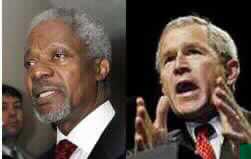HIGHLIGHTS: Baghdad Urges "Technical Discussions" on Renewed UN Arms Inspections||Delegation Could Prepare for a Re-establishment of the Surveillance System and Prepare for Application of All the Pertinent Security Council Resolutions||Bush Defends His Iraq Policy against Criticism from within His Own Republican Party|| STORY: Iraq has urged fresh "technical discussions" on renewed UN arms inspections "to achieve the full implementation of Security Council resolutions in accordance with the UN Charter", an official text of its reply to UN chief Kofi Annan said.
"We are renewing this offer for the holding of technical discussions to review what was achieved in the last phase (of weapons inspections) and discuss how to tackle issues which were still not settled when the inspectors left Iraq of their own accord in 1998," Foreign Minister Naji Sabri wrote to Annan, according to the text carried by the official INA news agency.
"The technical delegation from the United Nations will be able to raise all matters it deems necessary to advance the discussions and establish the groundwork for the next phase of monitoring and inspection," the letter said.
He said the delegation "could also examine the practical preparations with a view to a re-establishment of the surveillance system in the future and prepare the ground for the simultaneous application of all the pertinent Security Council resolutions."
Iraq was "keen to continue dialogue with the UN Secretariat, despite the difficulties, with the aim of fully implementing Security Council resolutions in accordance with the UN Charter," he said.
On August 6, Annan wrote to Sabri asking him to confirm Iraq's readiness to abide by all Security Council resolutions, after he rejected an offer from Baghdad for talks with chief UN weapons inspector Hans Blix.
In his letter, Sabri said Baghdad's proposal for technical discussions was intended "to avoid the disagreements and crises which marked the work of inspectors in the past and build a solid base for future cooperation."
"Without settling the questions in abeyance, it will be difficult to start a new stage marked by professional cooperation and we would return to the same minefield... of disagreements and crises," he said.
"The proposal contained in our letter constitutes an important step toward the conclusion of a global agreement guaranteeing the simultaneous application of the pertinent Security Council resolutions."
The minister also criticized Blix for turning down an Iraqi invitation for him to visit Baghdad to review what had been done to disarm Iraq, saying his attitude was similar to that of his predecessor, Richard Butler, "who exceeded in his behaviour and statements the authority of the UN secretary general and Security Council."
Blix, who heads the UN Monitoring, Verification and Inspection Commission (UNMOVIC), set up in December 1999 to replace the former inspectorate, UNSCOM, had said it was for the Security Council to decide if he would go to Iraq. The United States dismissed the invitation as a stalling tactic.
Blix said on Friday Iraq must let him start work before he could assess what it needs to do to satisfy the Security Council it has disarmed.
Iraq accused UNSCOM director Butler of spying for the United States and has not allowed UNMOVIC to set foot in the country. UNSCOM withdrew its inspectors on the eve of a US and British bombing campaign in late 1998.
In New York, a spokeswoman said the United Nations had received a reply from the Iraqi government setting out its position on the possible resumption of UN arms inspections.
The letter was received late Thursday and was still being translated from Arabic into English, spokeswoman Hua Jiang told AFP, adding that for the moment she did not know what it contained.
BUSH DEFENDS IRAQ POLICY
President Bush on Friday defended his Iraq policy from criticism within his own Republican Party, saying he would consult with others but make decisions based on the "latest intelligence."
Bush has made ousting Iraqi President Saddam Hussein one of his top priorities, but dissent from within his own political ranks has persisted. The national security adviser during Bush's father's presidency said on Thursday an attack on the oil-producing nation could alienate U.S. allies.
Bush characterized that dissent as a healthy debate, but left no doubt about his opinion.
PHOTO CAPTION
(L) Annan speaks to the media following a luncheon meeting with members of the U.N. Security Council at United Nations headquarters in New York on August 5. (Mike Segar/Reuters)
- Aug 08 6:38 PM ET
(R) President George W. Bush responded to criticism of his Iraq policy from within his own Republican Party by saying August 16, 2002 he would consult with others but make decisions based on the 'latest intelligence.' Bush speaks during a fund raising event at the University of Wisconsin in Milwaukee, August 14. Photo by Larry Downing/Reuters
- Aug 16 2:44 PM ET
- Author:
& News Agencies - Section:
WORLD HEADLINES


 Home
Home Discover Islam
Discover Islam Quran Recitations
Quran Recitations Lectures
Lectures
 Fatwa
Fatwa Articles
Articles Fiqh
Fiqh E-Books
E-Books Boys & Girls
Boys & Girls  Women
Women










